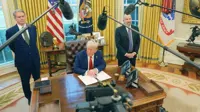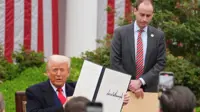Talks between British Prime Minister Theresa May’s government and opposition Labour aimed at breaking the Brexit impasse have ended without an agreement, putting Britain’s divorce from the European Union again in disarray.
The Labour Party leader Jeremy Corbyn said the discussions had "gone as far as they can", but said the talks failed due to what he called the government's "increasing weakness and instability".
Theresa May said the lack of a "common position" within Labour over a further referendum had made talks "difficult".
The prime minister said she would now consider putting options to MPs on Brexit that may "command a majority".
Irish Prime Minister Leo Varadkar called the end of the talks a "very negative development".
May has promised she would be leaving Downing Street after a House of Commons vote on her EU Withdrawal Agreement Bill in the week beginning 3 June.
Brexit, which had to take place on 29 March failed one deadline after MPs voted down the deal May had negotiated with the EU thrice. The EU had since given the UK time until 31 October for the exit.
With an extended deadline he ruling Conservatives and opposition labour have started fresh negotiations aimed at arriving at an agreement despite differences over issues like membership of a customs union.
Nearly three years after the United Kingdom voted 52 per cent in a referendum to leave the EU, it remains unclear how, when or even if it will leave the European club it joined in 1973.
It is now developed into a show of strength between the ruling Conservatives and opposition Labour.
“We have been unable to bridge important policy gaps between us,” Corbyn, a socialist who voted against joining the predecessor of the EU in 1975, wrote to May.
“Even more crucially, the increasing weakness and instability of your government means there cannot be confidence in securing whatever might be agreed between us,” Corbyn said
He said Labour would oppose May’s deal when it returns to parliament early next month. He later told reporters there was no chance of getting even part of a Brexit deal ratified by the end of July.
The divorce deal, which May agreed last year with the EU, has been rejected three times by parliament. May plans to put part of her deal, contained in the Withdrawal Agreement Bill, to a vote in parliament in early June.
























